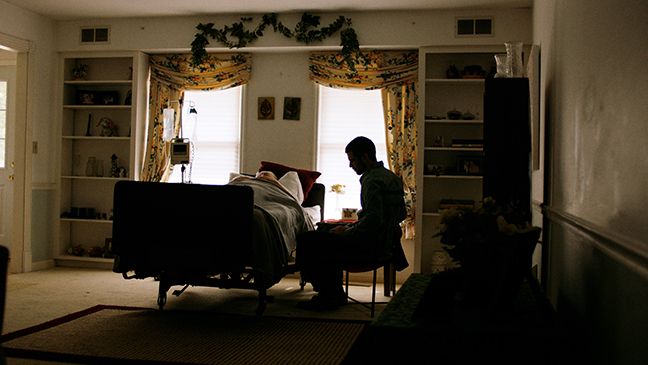Rural Noir (a.k.a. Neo Noir) is as good a genre as any to start a career. Reputations have been made on the strength of films like Blood Simple, the Coen Brothers' first official outing, and One False Move, starring and written by Billy Bob Thornton. Noir is relatively easy: all you need is shadows, a gun, and a makeup person who can make convincing bruises and crusted blood. Get decent actors and a director with an eye and you're good to go.
Noir is also easy on the budget. Both Jeremy Saulnier's Blue Ruin and Trey Edward Shults' Krisha (which, while not technically Noir, dealt with similarly uncomfortable family dynamics) were financed by Kickstarter. The film being reviewed, Hungry Dog Blues, follows in that DYI tradition. It was made with $150,000.00 of friends' and family's money and filmed at the height of the Covid lockdown. That spells dedication for its writer, director, and ostensible star Jason Abrams, who'd been kicking around L.A. and New York doing shorts and who returned to his hometown St. Louis, MO to make his opus. That's the other ingredient for Noir: faith.
The film opens on a living room with an occupied hospital bed. A lone figure in a straight back chair sits vigil. No one moves. A man's voice tinnily makes a naked plea for help: "You have to find the money, son. You have to help me." The scene sets the tone for tragedy. Hungry Dog Blues has a provocative moral dilemma at its core: how far will you go to save your own father?

Two estranged half-brothers (Abrams and CJ Wilson) kidnap the lead witness testifying against their incarcerated father (Steven Peterman heard on voice mail) in order to prove his innocence. What ensues is a drama played out in rooms and cars, propelled by the physical look of the characters. Brother Charlie is a t-shirted hothead; Terence is a cautious, button-down family man. Their hostage Ronnie (Amy Hargreaves, recently seen in Homeland), who's used to being blindfolded and worse, has a daughter Tina, pregnant and ready to pop, played by Irina Gorovaia (memorable as the child Margot in Wes Anderson's The Royal Tannenbaums). They play out a dastardly game of red herrings and double crosses that will appeal to everybody's basest instincts.
Jason Abrams' dialogue is hard-bitten, terse, albeit a little stilted, hard for the actors to get their mouths around. Phrases are repeated -- notably "I don't see us having another choice," and "Don't f*ck with me!"-- and the acting is uneven, believable in bursts. CJ Wilson and Jim Walker, who plays a shifty business associate of Dad's, have a particularly hard time of it. Wilson, familiar from TV's The Blacklist and Netflix's The Trial of the Chicago Seven, has a sonorous voice suited for the stage, but seems uncomfortable with the physical aspect of his part.
As a director Abrams keeps the action close and compelling. He has an eye for forlorn landscapes, bolstered by Christopher Braun's sharp cinematography. Their team makes a lot out of a little. But the scenes are really kept together by inventive montage (editing credits go to Mike Mazzota and Abrams), and by John Carey's original score, which stays under the surface and subliminally fills in attitude where the script and actors don't.
The ending is a tad sentimental, and some of the plot defies logic, but one could do worse than to see Hungry Dog Blues. It's an impressive first effort and should lead to more from Abrams and company.
_______________________________________________________
Hungry Dog Blues. Written and directed by Jason Abrams. 76 minutes. Released by Freestyle Digital Media, DVD and VOD on April 25, 2023. Photo appears courtesy of Freestyle Digital Media.
